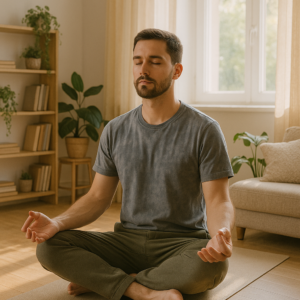Freedom or Loneliness? Navigating the Bachelor Mindset

Lonely But Free? Exploring Emotional Health in the Bachelor Lifestyle
In today’s fast-paced, hyper-connected world, the concept of the bachelor lifestyle has evolved dramatically. No longer defined strictly by age or marital status, bachelorhood now encompasses a wide spectrum of personal choices and life stages—some temporary, others permanent. Many choose to remain single to focus on careers, self-development, or personal freedom. But behind the perceived independence and flexibility, there often lurks an underexplored dimension: emotional health.
Is the bachelor lifestyle truly liberating, or does it silently nurture feelings of isolation, anxiety, and emotional instability? In this article, we explore both sides of the coin—how being single can foster growth and freedom yet also challenge emotional well-being.
The Allure of Freedom
While bachelorhood is often stereotyped as lonely or incomplete, many find it to be a deeply fulfilling and liberating phase of life. Beyond the surface-level assumptions lies a nuanced experience that fosters personal growth, emotional resilience, and a unique sense of autonomy. Here’s how bachelorhood can become a source of strength rather than struggle:
1. Independence and Autonomy
One of the most celebrated aspects of bachelorhood is the ability to make life decisions without compromise. From career choices to travel plans and daily routines, bachelor’s often enjoy unmatched autonomy. This freedom can lead to increased self-awareness and confidence—key ingredients for emotional resilience.
2. Space for Self-Discovery
Living alone or being single gives individuals more time to understand themselves. Hobbies, spiritual practices, and personal goals can flourish in an environment where one is not constantly balancing someone else’s needs. This self-exploration often leads to emotional clarity and growth.
3. Financial Flexibility
Bachelors frequently have more control over their financial priorities. Whether it’s investing in education, health, or experiences, this independence can reduce stress and improve overall life satisfaction.

The Hidden Cost: Emotional Health Risks
While the bachelor lifestyle offers numerous advantages—independence, flexibility, and freedom—it also brings with it certain emotional and psychological challenges that are often overlooked. Many bachelors enjoy the ability to shape their daily lives according to their own preferences, but this sense of autonomy can sometimes come at the expense of emotional well-being.
1. The Loneliness Epidemic
According to numerous global studies, prolonged social isolation is a growing public health concern. Bachelors, especially those who live alone, often experience extended periods of solitude. Without regular emotional interaction, this can lead to:
-
Depression
-
Anxiety
-
Sleep disorders
-
Reduced cognitive function
2. Social Stigma and Pressure
In many cultures around the world, the societal expectation is that adulthood is closely tied to marriage or being in a long-term relationship. As a result, remaining single beyond a certain age often invites judgment, pity, or ridicule. For bachelors, this can create a sense of pressure to conform to societal norms and expectations, even if they’re comfortable with their lifestyle.
The stigma surrounding bachelorhood can manifest in various ways, from intrusive questions about relationships to assumptions that bachelors are somehow incomplete or emotionally immature. Over time, this external judgment can cause significant harm. Those who feel the weight of these societal views may internalize them, leading to feelings of inadequacy, low self-esteem, or even shame. The emotional toll can be significant, especially for those who might already feel isolated in their personal lives.
Culturally, single adults—especially men—are often seen through the lens of stereotypes: emotionally unavailable, incapable of commitment, or unwilling to grow up. Such assumptions not only undermine the dignity of bachelor’s but also can impact their ability to form new connections. The pressure to “fit in” can make it difficult to embrace one’s independence and enjoy bachelorhood without feeling like something is missing.
3. Lack of Emotional Support
One of the most significant emotional risks of bachelorhood is the absence of a built-in support system that married individuals often enjoy. Partners provide a consistent, reliable emotional anchor during difficult moments, and without this, bachelor’s may find themselves navigating challenges like job loss, illness, or family crises entirely on their own.
In times of stress, the absence of a partner to turn to can make a seemingly manageable situation feel overwhelming. This lack of emotional support can manifest in feelings of loneliness and helplessness. Bachelors may struggle to find people who are readily available to offer comfort or assistance when needed, and this isolation can exacerbate feelings of anxiety and sadness.
The reality is that most people—whether single or not—will face moments in life when emotional support is essential. Whether dealing with a loss, a health scare, or a personal failure, not having someone by your side to provide emotional reassurance can significantly affect mental health. Friends and family can offer support, but the intimacy and consistency of a romantic relationship often provide a unique type of comfort that is hard to replicate
Who’s Most at Risk?
Bachelorhood doesn’t impact everyone equally. Emotional outcomes often depend on:
-
Age: Older bachelors may struggle more with loneliness due to shrinking social circles.
-
Gender: Studies suggest single men are more vulnerable to mental health issues than single women, largely due to societal expectations around emotional expression.
-
Cultural Context: In traditional societies like Bangladesh or India, single adults often face more social isolation than in Western countries.
-
Living Situation: Bachelors who live completely alone are at higher risk of emotional distress compared to those with roommates or active social lives.
Signs That the Bachelor Life May Be Harming Your Emotional Health
Not every bachelor experiences emotional turmoil, but watch out for these red flags:
-
Feeling persistently lonely, even in social settings
-
Avoiding meaningful conversations
-
Increased reliance on alcohol, smoking, or digital distractions
-
Sleep disturbances or irregular eating patterns
-
Apathy towards activities you once enjoyed
-
Reduced motivation or purpose
If these symptoms persist, it may be time to reassess lifestyle choices and seek support.
Tips for Maintaining Emotional Health as a Bachelor
So, how can one enjoy the perks of bachelorhood without falling into emotional quicksand?
1. Build Strong Social Connections
Human connection is essential. Cultivate deep friendships, join clubs, attend events, or volunteer. Regular, meaningful interaction is key to emotional balance.
2. Adopt Healthy Routines
Establish a structure for your day—mealtimes, sleep schedules, exercise, and downtime. Routine adds stability and predictability, both essential for mental well-being.
3. Prioritize Mental Wellness
Don’t ignore signs of burnout or emotional fatigue. Practices like meditation, journaling, or therapy can go a long way in maintaining mental clarity and emotional strength.
4. Embrace Vulnerability
Allow yourself to be emotionally open with trusted friends or mentors. Breaking the “tough guy” or “independent woman” mold can lead to more meaningful connections.
5. Explore Hobbies and Passions
Use your free time productively. Learn a new instrument, take up painting, or travel solo. These activities can bring joy, confidence, and a sense of purpose.
Bachelorhood During Life Transitions
Being a bachelor during key life transitions—like moving cities, changing careers, or aging—can intensify emotional turbulence. Here’s how to cope:
Transitioning Into Bachelorhood (Post-Breakup or Divorce)
-
Give yourself time to heal
-
Focus on self-discovery rather than rebounding
-
Reconnect with old friends or hobbies you lost touch with
Middle-Aged and Single
-
Shift focus from what’s missing to what’s possible
-
Join communities that offer support for older singles
-
Consider therapy to explore your emotional needs
Elderly Bachelors
-
Prioritize community-based living options
-
Stay mentally active through reading, puzzles, or digital courses
-
Consider adopting a pet for companionship
When Freedom Feels Like a Trap
While bachelorhood often symbolizes freedom and independence—stability in career, a cozy home, and the ability to live on one’s own terms—many bachelors experience a subtle emptiness beneath the surface. This paradox, known as “freedom fatigue,” arises when constant independence becomes isolating.
What begins as an exciting freedom can, over time, feel like a trap when it leads to emotional detachment. The absence of interdependencies—the small moments that connect us to others—can make life seem hollow.
Key Insight:
True fulfillment doesn’t come from independence alone. Freedom is most meaningful when it’s tied to purpose. Without connection or meaningful relationships, even the most autonomous life can feel incomplete. This lack of purpose often leads bachelors to question the point of their choices, even when everything seems perfect on the surface.
Should You Abandon Bachelorhood?
Absolutely not—unless that’s your personal desire. The goal isn’t to romanticize or demonize any lifestyle but to align your choices with your emotional needs.
Ask yourself:
-
Do I feel fulfilled in my current life?
-
Am I open to emotional growth and connection?
-
Is my independence costing me more than it’s giving me?
Answering these questions honestly can guide your next steps—whether that’s staying single, dating, or investing more in friendships and emotional well-being.
The Rise of Intentional Singlehood
Not all bachelors are struggling with loneliness or emotional distress. In fact, a growing number of people are embracing intentional singlehood—a conscious decision to live solo while focusing on personal growth, emotional health, and meaningful relationships. Rather than living alone out of circumstance or avoidance, these individuals are choosing to prioritize their independence while actively nurturing their well-being.
This new approach to bachelorhood isn’t about detaching from others or withdrawing from society. It’s about creating a balanced life where emotional fulfillment comes from self-awareness, personal development, and meaningful social connections outside of romantic relationships. Intentional singlehood emphasizes the idea that being single doesn’t have to mean being isolated. It’s about investing in oneself, whether that means pursuing passions, strengthening friendships, or simply learning to enjoy solitude in a healthy way.
This evolving mindset proves that emotional health isn’t solely dependent on romantic involvement. People who practice intentional singlehood focus on maintaining strong social circles, developing new skills, and nurturing their mental and physical well-being. By being intentional, they are not just surviving as bachelor’s but thriving in a lifestyle of independence and fulfillment.

Endnote
The bachelor lifestyle offers unparalleled freedom, but freedom without emotional fulfillment can quickly become a silent prison. The key lies in balance—between solitude and social life, independence and emotional support, self-reliance and vulnerability.
Lonely but free? Maybe.
But with the right mindset, community, and self-awareness, you can be free and emotionally healthy.







